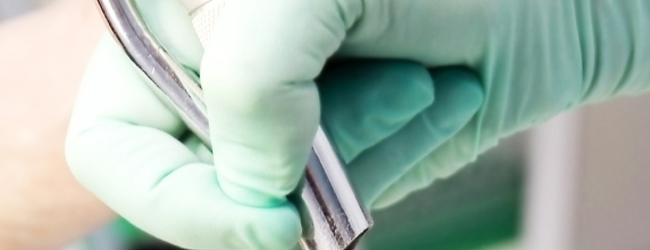
At Barrett Podiatry, we consider surgery a final option – only after all conservative, non-surgical options have been attempted, but have failed to render relief. When discussing surgery, we provide various surgical options depending on the patient ailment and overall health status. We can tailor fit surgical options to your needs and your ability to heal.
What to expect for your surgery:
Morning of Surgery
- Do not eat or drink anything, gum included!
- If you take daily medications, please consult your physician about which medications can be taken with a sip of water on the day of surgery.
- Shower and wash the surgical area again with Antibacterial Soap.
- Do not wear any moisturizers, creams, lotions, colognes/perfumes, or anything that will leave a film on your skin.
- If you wear contacts, either wear your glasses or you must bring your contact case with you so you can remove them prior to surgery.
- Wear comfortable loose-fitting clothing.
- Do not bring jewelry or other valuables with you. Remove all piercings. Do not wear any hair clips or pins.
- Have a family member or friend over the age of 18 there to pick you up. (You will not be released to a taxi or any other kind of transportation service).
- Have a family member or friend with you 24 hours post surgery.
Preoperative Exam
A preoperative exam is a physical examination which specifically focuses on your feet and your the systems in your body that can be negatively affected by anesthesia or surgery. Preoperative exams provide us with valuable information that helps us to determine which patients may need extra monitoring during their procedures. Discuss the medications that you are on and which needs to be discontinued before surgery. Such as aspirin or steroids.
Who needs a Preoperative Exam? We recommend that anyone who has not had a physical exam within one year be seen by their regular physician prior to surgery. We also recommend preoperative clearance for anyone who has a health condition such as high blood pressure, diabetes, hyperthyroidism, asthma, or seizures. All smokers should obtain clearance as well.
What happens if I am not cleared? If your preoperative exam physician identifies a problem, surgery may be delayed. However, most of our patients need only to have medication adjusted or additional testing before their surgery can be performed.
When can my surgery be scheduled? As soon as a preoperative clearance form is received, we can proceed with scheduling. Sometimes a primary care physician may need 1–2 days after your visit to fax the necessary form back. Please ask your pre–op physician to let you know when they have sent us your forms. Our surgery scheduler will contact you on the same day they are received.
Preparing for Surgery
- Stop Smoking: Smoking reduces circulation to the skin and impedes healing. Stop smoking completely at least 2 weeks before surgery. Discuss plans to use nicotine patches with your doctor because these should also be eliminated at least 2 weeks before surgery.
- Diet Pills: It is advised that patients having elective (non–emergency) surgery discontinue Phentermine, Redux, Metabolite, Metabolife or any ephedra–containing herbal products at least 2 weeks before having general anesthesia. Drug interactions between these pills and anesthetic agents could result in disturbances in heart rhythms and even cardiac arrest and death.
- DO NOT TAKE Aspirin or Ibuprofen–Related Products: Stop taking medications containing aspirin or ibuprofen. Such drugs can cause bleeding problems during and after surgery. Instead, use medications containing acetaminophen (such as Tylenol). If you have questions about a specific prescription or over the counter medication, please ask our doctors.
- Alcohol: Limit alcohol intake to one beer or a glass of wine three days before your surgery. No drinking the night before and after the operation. Its recommended not to consume alcohol with most medications.
- Fill Your Prescriptions: You will be given prescriptions for pain medications. Please have them filled before/or on the day of surgery.
- The Night Before Surgery: Shower and wash the surgical area with Dial soap. Do not eat or drink anything after 12:00 midnight on the night before surgery. This includes water and coffee.
Surgery and Anesthesia – Common Risks
- Hematoma: Small collections of blood under the skin are usually allowed to absorb spontaneously. Larger hematomas may require aspiration, drainage, or even surgical removal.
- Inflammation and Infection: A superficial infection may require antibiotic ointment. Deeper infections are treated with antibiotics. Development of an abscess will usually require drainage.
- Anesthesia: Many patients have a fear of anesthesia. Extremely sensitive monitors that are used during surgery have greatly reduced the risks. This sophisticated monitoring makes recognition and treatment of problems with anesthesia almost immediate. Our physicians choose to operate in facilities where they have great confidence in the anesthesiologists and the monitoring equipment available. Your anesthesiologist will discuss the specific risks with you before surgery.
Postoperative Care
Swelling and Bruising: Some swelling and bruising can be expected after any surgery. However, severe swelling or bruising may be an indication of infection or excessive bleeding. If this occurs please contact your doctors office immediately.
Discomfort and Pain: Mild to moderate discomfort is normal after any surgery. If pain becomes severe and is not relieved by pain medication, please contact your doctors office immediately.
Crusting Along the Incision Lines: We usually treat this with antibiotic ointment.
Numbness or Burning: Small sensory nerves to the skin surface are occasionally cut or pulled on when an incision is made. The sensation in those areas gradually returns (usually in 2–3 months) as the nerve endings heal.
Itching: Itching and occasional small shooting electrical sensations within the skin frequently occur as nerve endings heal. Ice and massage are frequently helpful.
Redness of Scars: All new scars are red, dark pink, or purple. Depending on the part of the body, this coloration gradually fades over time.
